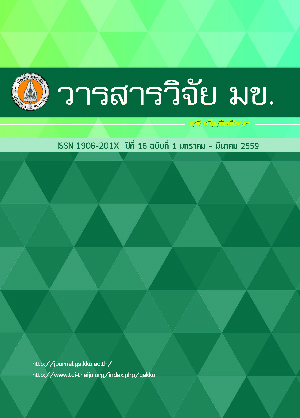การประเมินความพึงพอใจของผู้รับบริการการแพทย์แผนไทย โรงพยาบาลของรัฐ จังหวัดอุดรธานี (Assessment of Patients' Satisfaction in Thai Traditional Medicine Services at Government Hospitals, Udon Thani Province)
Keywords:
การแพทย์แผนไทย (Government hospitals), ความพึงพอใจ (Patients' satisfaction), โรงพยาบาลของรัฐ (Traditional medicine)Abstract
บทคัดย่อ
การวิจัยนี้มีวัตถุประสงค์เพื่อสำรวจความพึงพอใจของผู้รับบริการการแพทย์แผนไทย ปัจจัยส่วนบุคคลและปัจจัยด้านการบริการที่ส่งผลต่อความพึงพอใจของผู้เข้ารับบริการ และความสัมพันธ์ระหว่างผลการประเมินมาตรฐานงานบริการการแพทย์แผนไทยตามเกณฑ์มาตรฐานโรงพยาบาลส่งเสริมและสนับสนุนการแพทย์แผนไทยและการแพทย์ผสมผสาน (รพ.สส.พท.) กับความพึงพอใจของผู้รับบริการ โดยใช้แบบสอบถามในการเก็บข้อมูล มีการประเมิน 5 ระดับ คือ เห็นด้วยมากที่สุด เห็นด้วยมาก เห็นด้วยปานกลาง เห็นด้วยน้อย และเห็นด้วยน้อยที่สุด มีการสำรวจในกลุ่มตัวอย่างผู้เข้ารับบริการการแพทย์แผนไทย ระหว่างเดือนเมษายน-เดือนมิถุนายน พ.ศ. 2557 ณ โรงพยาบาลรัฐจำนวน 17 แห่ง ในจังหวัดอุดรธานี โดยการสุ่มตัวอย่างแบบง่าย ประมวลผลข้อมูลโดยใช้โปรแกรม SPSS version 19 วิเคราะห์ข้อมูลทั่วไปของผู้ตอบแบบสอบถามแสดงเป็นค่าความถี่และร้อยละ วิเคราะห์ปัจจัยที่มีผลต่อความพึงพอใจของผู้รับบริการด้วยสถิติ Chi-square และ Multiple Regression Analysis Method Stepwise และวิเคราะห์ความสัมพันธ์ระหว่างผลการประเมินมาตรฐานงานแพทย์แผนไทยตามเกณฑ์ รพ.สส.พท. กับความพึงพอใจของผู้รับบริการด้วยสถิติ Correlation coefficient จากผู้ตอบแบบสอบถามทั้งหมดจำนวน 2,546 รายพบว่า ผู้รับบริการมีความพึงพอใจต่องานบริการแพทย์แผนไทยที่ระดับพึงพอใจมาก (ค่าเฉลี่ย 3.81 ส่วนเบี่ยงเบนมาตรฐาน 0.43 จากคะแนนเต็ม 5 คะแนน) ปัจจัยส่วนบุคคลที่ส่งผลต่อความพึงพอใจ ได้แก่ อายุ กลุ่มอาการที่ทำให้ต้องมาใช้บริการ วัตถุประสงค์ในการเข้ารับบริการ ประเภทของการบริการที่เข้ารับบริการ และขนาดสถานบริการที่เข้ารับบริการ ปัจจัยด้านการบริการในทุกด้านได้แก่ ด้านความสะดวก ด้านการประสานงาน ด้านการบริการของเจ้าหน้าที่ ด้านข้อมูลที่ได้รับ ด้านค่าใช้จ่าย ด้านผลิตภัณฑ์สมุนไพร และด้านคุณภาพและบริการ ส่งผลต่อความพึงพอใจของผู้เข้ารับบริการอย่างมีนัยสำคัญทางสถิติ (p<0.05) และพบความสัมพันธ์ระหว่างผลการประเมินมาตรฐานงานบริการกับความพึงพอใจในระดับค่อนข้างต่ำ โดยมีค่าสัมประสิทธิ์สหสัมพันธ์ (R) เท่ากับ 0.351 (p<0.05) ความพึงพอใจต่อคุณภาพและการบริการมีระดับความสัมพันธ์สูงสุด (R = 0.300) ดังนั้นแต่ละสถานบริการควรให้ความสำคัญต่อผู้เข้ารับบริการและควรมีการพัฒนาคุณภาพของการให้บริการทุกๆด้านเพื่อให้ผู้เข้ารับบริการพึงพอใจต่อการบริการที่ได้รับ ซึ่งจะเป็นการสนับสนุนให้สถานบริการนั้นได้รับผลการประเมินมาตรฐานงานบริการแพทย์แผนไทยในระดับที่สูงด้วย
ABSTRACT
The objectives of this study are to investigate the satisfaction of patients who received services of Thai traditional medicine, the factors of individuals and services affecting the satisfaction of patients and correlations between the results of evaluation scores according to Thai Traditional Medicine & Integrative Medicine Promoting Hospital Standard (TIPhS) and satisfaction of patients. The data were collected by using questionnaires, 5-scale rating questions were strongly agree, agree, undecided, disagree and strongly disagree. Samples were collected in patients who received Thai traditional medicine services during April - June 2014 at 17 governmental hospitals in Udon Thani province by simple random sampling. The data were processed by SPSS program (version 19). Patient characteristics were analyzed for frequency and percentage. Factors affecting patients’ satisfaction were analyzed by Chi-square and multiple regression analysis method stepwise. The correlation between the result of evaluation scores according to TIPhS and patients’ satisfaction were analyzed by correlation coefficient. A total of 2,546 patients were enrolled into the study. The satisfaction most common level evaluated by participants was “high” (mean at 3.81 and standard deviation at 0.43 of full score at 5). Individual factors found to have influence on satisfaction levels were age, physiologic system of symptom, purpose of obtaining medical service, type of medical service and size of hospitals. All service factors were convenience, coordination, service mind, quality and services, information about medical services, service fees and herbal products approved to affect satisfaction of patients in statistically significant manner (p<0.05). The correlation between the result of evaluation scores according to TIPhS had low correlation with satisfaction of patients and the correlation coefficient (R) at 0.351 (P<0.05). Satisfaction of patients on quality and services had the highest correlation (R=0.300). Therefore, each hospital should give importance to patients receiving service and improve the quality of service in order to ensure that patients satisfied service to received and encourage hospitals to receive the results of evaluation according to TIPhS in high level



